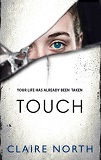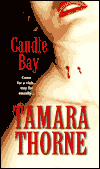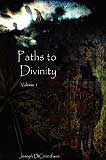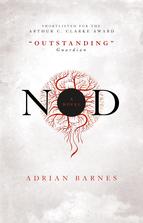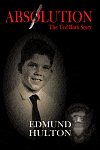
Absolution: The Ted Roth Story, by Edmund Hulton
Book Review by Mike Swope
Have you read this book?
Other reviewers have written that you won't want to put down this book.
To some degree, I must agree with them. Though I first thought this book
was a biography about a serial killer I had never heard about (the
review list wasn't clear about the genre, or it didn't matter because
the book sounded interesting, take your pick), I quickly questioned the
biography because it was too internalized, too detailed, bordering on
too gruesome for most publishers. Despite its flaws, which are a matter
of opinion anyway, Absolution: The Ted Roth Story is a good, violent,
gory well-written read which borders on fun.
Ted seems to be your average boy, but he can't take rejection well. For some reason, his closest friends and girlfriends can't help but personally betray him. He kills his first victim, his best friend Charlie, with a knife at ten years old, and frames their mutual friend Johnny for the crime. His second and third victims, Frankie Bates and Jamie Carver, he kills when he is a senior in high school, for cheating on him together. He kills his fourth victim, Professor Risner, when he is a freshman in college after only a few weeks of sharp personal attacks and criticisms (no friendship or love in this relationship). Ted's fifth victim was Father Harold, whom he killed because he raped Kayley years before, when she was a nun (the incident caused her to leave the nunnery). Some time later, Ted and Kayley marry and raise a family. More than twenty uneventful, corpse-free years later, after getting a bit drunk, Ted confesses these murders to a past business associate who just happens to be connected to a powerful-but-private political group calling themselves the Assembly, whose members include the Vice President, the Chairman of the Joint Chiefs, the Secretary of Defense, the Attorney General, the directors of the FBI and CIA, and others, which leads to blackmail...
It is an engrossing story, if far-fetched. It sucks readers in at the start, a twisted coming-of-age story gone murderously wrong, then takes them through Ted's evolution from a personal, selfish murderer into a murderer who can kill without the childish pain or rage necessary to precipitate his first three murders. Incidentally, as Ted evolves, he also becomes a wealthy and noteworthy businessman and consultant who moves in larger social circles. This seems to be a social commentary about the skills and detachment necessary to achieve the kind of success enjoyed by only a select few in this country. Since Ted's business is based on IBM and the computer industry, a few such successful businessmen come to mind, an interesting comparison to and juxtaposition with Ted Roth. It should be clear, however, that the ever convoluted and loosely knitted plot can, with a good measure of suspended disbelief, also be fun to witness. This is part of Absolution's charm. Readers don't exactly know what will happen next, so they keep turning the pages.
Absolution is hard to put down, too, for its murder scenes. I would compare the early scenes to train wrecks or any other horrible but horribly fascinating scene. No one can look way. The first two murder scenes are also particularly sexually graphic, and fill almost exactly half the pages in the book, which seems appropriate for the emotionally charged coming-of-age theme, particularly of these early scenes. Hulton has written them with care and clarity that readers truly see them through Ted's eyes. The later murder scenes are shorter and less emotionally charged, but they are no less well written. Instead, they demonstrate Ted's evolution as a psychopath. Altogether these murder scenes in Absolution are graphic, imaginative, detailed and well-paced. Readers need not fill in any details; Mr. Hulton provides them all. Perfectly. Shockingly so for new readers.
Absolution's greatest strength, however, is its powerful writing. No book is any good without powerful writing. Some books are acclaimed for it alone. Despite the loose plot development and the unnecessary frame (the book pretends to be an audio recording made by Ted during his last hours of life, a heavy-handed technique which only serves to annoy readers as it interrupts the real story), Absolution is well written. Sprinkled with a few typos or missing words as one might expect from a digital publisher, Absolution nevertheless hits all the right notes at the right times for the right duration to make the individual scenes memorable and ring like a fine concerto. For the writing alone, readers should pick up a copy of Absolution: The Ted Roth Story, and discover an author worth watching.
Ted seems to be your average boy, but he can't take rejection well. For some reason, his closest friends and girlfriends can't help but personally betray him. He kills his first victim, his best friend Charlie, with a knife at ten years old, and frames their mutual friend Johnny for the crime. His second and third victims, Frankie Bates and Jamie Carver, he kills when he is a senior in high school, for cheating on him together. He kills his fourth victim, Professor Risner, when he is a freshman in college after only a few weeks of sharp personal attacks and criticisms (no friendship or love in this relationship). Ted's fifth victim was Father Harold, whom he killed because he raped Kayley years before, when she was a nun (the incident caused her to leave the nunnery). Some time later, Ted and Kayley marry and raise a family. More than twenty uneventful, corpse-free years later, after getting a bit drunk, Ted confesses these murders to a past business associate who just happens to be connected to a powerful-but-private political group calling themselves the Assembly, whose members include the Vice President, the Chairman of the Joint Chiefs, the Secretary of Defense, the Attorney General, the directors of the FBI and CIA, and others, which leads to blackmail...
It is an engrossing story, if far-fetched. It sucks readers in at the start, a twisted coming-of-age story gone murderously wrong, then takes them through Ted's evolution from a personal, selfish murderer into a murderer who can kill without the childish pain or rage necessary to precipitate his first three murders. Incidentally, as Ted evolves, he also becomes a wealthy and noteworthy businessman and consultant who moves in larger social circles. This seems to be a social commentary about the skills and detachment necessary to achieve the kind of success enjoyed by only a select few in this country. Since Ted's business is based on IBM and the computer industry, a few such successful businessmen come to mind, an interesting comparison to and juxtaposition with Ted Roth. It should be clear, however, that the ever convoluted and loosely knitted plot can, with a good measure of suspended disbelief, also be fun to witness. This is part of Absolution's charm. Readers don't exactly know what will happen next, so they keep turning the pages.
Absolution is hard to put down, too, for its murder scenes. I would compare the early scenes to train wrecks or any other horrible but horribly fascinating scene. No one can look way. The first two murder scenes are also particularly sexually graphic, and fill almost exactly half the pages in the book, which seems appropriate for the emotionally charged coming-of-age theme, particularly of these early scenes. Hulton has written them with care and clarity that readers truly see them through Ted's eyes. The later murder scenes are shorter and less emotionally charged, but they are no less well written. Instead, they demonstrate Ted's evolution as a psychopath. Altogether these murder scenes in Absolution are graphic, imaginative, detailed and well-paced. Readers need not fill in any details; Mr. Hulton provides them all. Perfectly. Shockingly so for new readers.
Absolution's greatest strength, however, is its powerful writing. No book is any good without powerful writing. Some books are acclaimed for it alone. Despite the loose plot development and the unnecessary frame (the book pretends to be an audio recording made by Ted during his last hours of life, a heavy-handed technique which only serves to annoy readers as it interrupts the real story), Absolution is well written. Sprinkled with a few typos or missing words as one might expect from a digital publisher, Absolution nevertheless hits all the right notes at the right times for the right duration to make the individual scenes memorable and ring like a fine concerto. For the writing alone, readers should pick up a copy of Absolution: The Ted Roth Story, and discover an author worth watching.
|
Click here to buy Absolution: The Ted Roth Story, by Edmund Hulton on Amazon
|
Absolution: The Ted Roth Story, by Edmund Hulton on Amazon

| More Books You Might Like |
Comment on Absolution: The Ted Roth Story, by Edmund Hulton
| Comments on Absolution: The Ted Roth Story, by Edmund Hulton |
| There are no comments on this book. |
